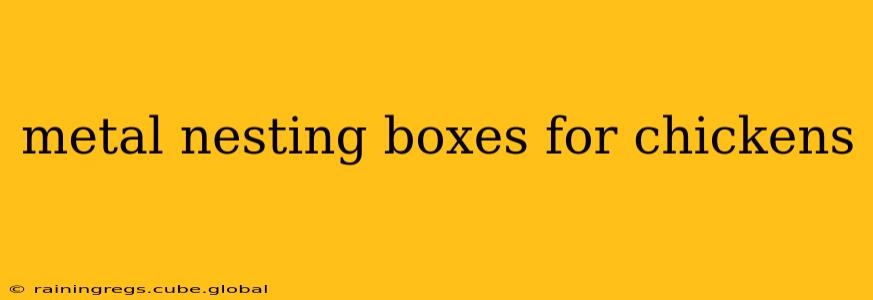Choosing the right nesting boxes is crucial for happy, healthy hens and easy egg collection. While wooden nesting boxes are traditional, metal nesting boxes offer several compelling advantages. This comprehensive guide explores the benefits, drawbacks, considerations, and frequently asked questions surrounding metal nesting boxes for your flock.
Why Choose Metal Nesting Boxes?
Metal nesting boxes are gaining popularity among chicken keepers for several reasons:
- Durability: Unlike wood, metal is resistant to rot, pests, and damage from pecking. This longevity translates to a longer lifespan and reduced replacement costs. They can withstand harsh weather conditions better than wooden counterparts.
- Easy Cleaning: Metal surfaces are much easier to sanitize than wood. A simple wipe-down with a disinfectant solution keeps the nesting boxes clean and hygienic, reducing the risk of bacterial and parasitic infections.
- Pest Resistance: Metal's non-porous nature makes it less susceptible to infestation by mites, rodents, and other pests that can harbor in wooden boxes.
- Temperature Regulation: Depending on the design and color, metal can offer better temperature regulation in extreme climates compared to wood. Darker metals can absorb heat, while lighter colors reflect it. However, ventilation is still crucial.
What are the Disadvantages of Metal Nesting Boxes?
While offering many benefits, metal nesting boxes also have some potential drawbacks:
- Heat Conductivity: In hot climates, metal can become excessively hot, making it uncomfortable for hens. Consider using a lighter-colored metal or providing shade to mitigate this issue.
- Cold Conductivity: Similarly, in cold climates, metal can get very cold, potentially impacting hen comfort. Adding insulation or using a thicker gauge metal can help.
- Initial Cost: Metal nesting boxes often have a higher initial purchase price compared to wooden alternatives. However, their longevity often offsets this cost over time.
- Potential for Noise: Metal-on-metal contact can create some noise when hens are entering and exiting the boxes.
How Many Metal Nesting Boxes Do I Need?
H3: The General Rule of Thumb
A good rule of thumb is to provide one nesting box for every three to four hens. However, this can vary depending on your flock's size, breed, and laying habits. Observing your hens will help you determine if you need to adjust the number of boxes. If hens are consistently fighting over boxes, you likely need more.
What Size Nesting Box is Right for My Chickens?
H3: Dimensions and Considerations
The ideal nesting box size for chickens is approximately 12 inches wide, 12 inches deep, and 12 inches high. However, some hens prefer smaller, more enclosed spaces, while others may prefer slightly larger ones. Consider providing a variety of sizes to accommodate different preferences within your flock.
Are Metal Nesting Boxes Safe for Chickens?
H3: Safety and Materials
Yes, metal nesting boxes are generally safe for chickens, provided they're made from non-toxic materials. Ensure the metal used is suitable for poultry and free from harmful chemicals or coatings. Look for nesting boxes made from galvanized steel or powder-coated metals designed specifically for animal housing.
How Do I Clean Metal Nesting Boxes?
H3: Cleaning and Maintenance
Cleaning metal nesting boxes is straightforward. Regularly remove soiled bedding and droppings. Periodically, thoroughly clean the entire box with a disinfectant solution (follow product instructions carefully) and allow it to dry completely before replacing bedding. This regular cleaning helps prevent the buildup of bacteria and parasites.
Where Can I Buy Metal Nesting Boxes?
H3: Sourcing and Availability
Metal nesting boxes are increasingly available from various suppliers. Check online retailers, farm supply stores, and local agricultural businesses. Consider comparing prices and features before making a purchase. Many suppliers offer custom sizes and configurations as well.
By carefully considering the advantages and disadvantages, and by selecting appropriate materials and sizes, you can provide your chickens with comfortable, durable, and hygienic metal nesting boxes that contribute to a healthy and productive flock. Remember to prioritize your hens' comfort and safety throughout the selection and implementation process.
